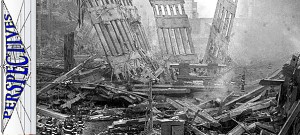
OPINION – It was just another morning of routine news, weather, and sports on our radio program. My co-host Mike McGary and I had just finished our first hour of the show when a news bulletin appeared about an apparent aviation accident in New York City.
We had just started our second hour of the show when an urgent call from a coworker on another radio station urged us to turn on the TV in our studio. A second plane had just flown into the World Trade Center and it was immediately clear that this was not an accident.
It was the start of the longest and most difficult day of my entire broadcast career.
Our normal routine came to a halt as we broadcast a network feed of the events that were beginning to unfold. Soon, we had reports of an explosion and fire at the Pentagon. Then came reports of another airliner going down in rural Pennsylvania. Our studio became a gathering place for people from throughout our office building who quietly watched the events unfold.
With each update we shook our heads in disbelief and thought that it couldn’t get worse — it did.
One after another, the towers crumbled and fell. Airplanes were ordered to land at the nearest available airports and aviation traffic came to a halt. It was a day filled with unending bad news. Later that evening when it was clear that the attacks were over, I went home, mentally and emotionally exhausted, and collapsed into my bed
In the days that followed the terror attacks, many people uttered the phrase, “9/11 changed everything.” Now, 12 years after the events, we can begin to see more clearly exactly how that day changed our nation.
There were some silver linings to the dark clouds that the attacks left over America. These included the undeniable selflessness and courage of the hundreds of first responders charging into the doomed towers even as thousands of people were fleeing. There was a palpable sense of national humility, patriotic unity, and service that flooded across the country in the days that followed.
Unfortunately, these short-term positives were soon overshadowed by other more malevolent changes that remain with us today.
The understandable fear and anger felt by most Americans following 9/11 provided government power-seekers and opportunists an opening for exploitation. Sorrow over the loss of nearly 3,000 innocent lives quickly morphed into a quest for vengeance.
Lobbyists who had for years been agitating for an invasion of Iraq used the nation’s fears to promote an unjust and unnecessary war against a nation that had nothing to do with 9/11. The quest to hold those who planned the attacks responsible soon became a longterm occupation of Afghanistan and ongoing military strikes in numerous countries.
Thousands of U.S. service members have died or been permanently maimed, and the countries invaded have become destabilized and more radicalized than before.
The U.S. government has squandered the Islamic world’s sympathy and has become widely hated by those who have seen innocent civilian lives accidentally snuffed out in its ongoing war on terrorism.
But the worst effects of 9/11 are those that have taken hold here at home. It turns out that the terrorists may not be our worst enemies. Much of the national security apparatus is focused inward on the American populace.
Robin Koerner spells it out clearly:
“Because of fear that one of us is a terrorist, we’ve allowed our intelligence services to listen into our private conversations; because of fear of terrorists from abroad, we have killed innocent people in foreign nations (supposedly to protect ourselves here); because of fear that our planes will get blown up, we let government agents put their hands on our children’s crotches and look at our naked bodies, and because of fear that the economy will implode, we’ve given trillions of dollars to organizations that have brought us to that point.
None of it feels very brave or free. None of it feels very American.”
The PATRIOT Act, the Military Commissions Act of 2006, the NDAA with its indefinite detention language, all demonstrate strong evidence of a corresponding loss of freedom in the name of protection.
Even down to the local level, our police forces are becoming increasingly militarized by anti-terrorism “gifts” from the federal government that blur the distinction between peace officers and soldiers.
We have been told that the terrorists attacked on 9/11 because they hated our freedoms. But no one has set about removing those freedoms with greater vigor than our own government. What should that tell us?
Bryan Hyde is a news commentator and co-host of the Perspectives talk show on Fox News 1450 AM 93.1 FM. The opinions stated in this article are his and not representative of St. George News.
Email: [email protected]
Twitter: @youcancallmebry
Copyright St. George News, SaintGeorgeUtah.com LLC, 2013, all rights reserved.

see today’s Bagley cartoon in the SLC Tribunez
Wow, Bryan and I agree on a few things. Mark the date!
.
Iraq War = bad idea; shouldn’t have gone there
.
Patriot Act = one of the worst pieces of legislation EVER
“We have been told that the terrorists attacked on 9/11 because they hated our freedoms. But no one has set about removing those freedoms with greater vigor than our own government. What should that tell us?”
Hit the nail right on the head with this one. Our own people have done more harm to Americans than the hijackers did on 9\11.
It is true that over 3,000 people needlessly died, but the real tragedy are the 300 million that were consequently enslaved under the false pretenses of security.